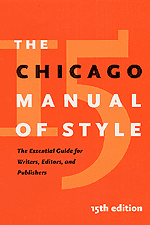Should the way people do speak dictate the way people should speak?
To wit: Should a stylebook (such as the MLA Handbook and the Chicago Manual of Style) take its cues from a dictionary, which records words as they’re used, or should a dictionary take its cues from a stylebook, which takes positions on how words ought to be used?
The former method constitutes the status quo: both MLA and Chicago follow Merriam-Webster’s Collegiate Dictionary. The problem is, Merriam-Webster doesn’t make recommendations; it records the most common spellings, not which spellings are necessarily correct.
Chicago contends that spelling issues such as capitalization, hyphenation, and compound words are for each writer to decide. Yet it offers no criteria by which writers can make these decisions. Should we use the word’s prestige? How it was first written? Its present-day connotation? Its frequency of usage?
Without a rule, or at least a rule of thumb, a writer is left to weigh each word on its own, capitalizing “Ivy League” but not “website”; unhyphenating “email” but not “e-book”; merging “smart” and “phone” but not “health care.”
But surely one of the purposes of stylebooks is to standardize such inconsistencies—to bring order to the chaos of “style.” Indeed, what makes stylebooks like Fowler’s and Strunk and White’s so important is that dictionaries are not the final word on semantics. That’s what stylebooks are for: to prescribe.
There’s a phrase for those charged with prescribing who instead parrot those charged with describing: dereliction of duty.

No comments:
Post a Comment